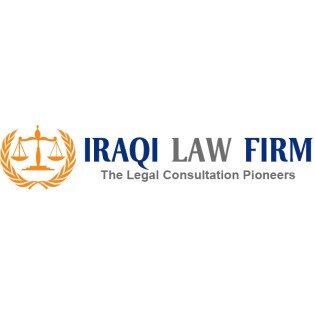Best Transportation Lawyers in Iraq
Share your needs with us, get contacted by law firms.
Free. Takes 2 min.
Or refine your search by selecting a city:
List of the best lawyers in Iraq
About Transportation Law in Iraq
Transportation law in Iraq governs the myriad elements of moving goods and people within the country and involves various types of transportation - road, air, rail, and maritime. Given the importance of transportation for trade and communication, these laws ensure the safety, efficiency, and regulation of vehicles, operators, and infrastructure. Iraq's transportation system is central to its economic development, with improvements and investments continuing to modernize existing facilities and networks.
Why You May Need a Lawyer
Legal advice in transportation can be critical for a multitude of reasons. Common situations where legal help might be necessary include disputes over contracts related to transportation services, issues concerning transportation of hazardous materials, compliance with safety regulations, or litigation following transportation accidents. Lawyers can also aid in navigating insurance claims, acquiring necessary permits, and advising on environmental impacts tied to transportation projects.
Local Laws Overview
Key aspects of local transportation laws in Iraq include the regulation of vehicle registration and operation, maximum load limits for freight, aviation safety standards, maritime shipping regulations, and public transport operation guidelines. The laws are enforced by government bodies to ensure compliance with international standards and to promote safety and efficiency. The transportation sector is subject to the rules set by the Ministry of Transport, which oversees road, civil aviation, and maritime transport policies.
Frequently Asked Questions
What are the requirements for registering a vehicle in Iraq?
Individuals must provide proof of identity, residency, and ownership, along with payment of applicable fees. Vehicles must pass inspections and comply with safety regulations.
How can I obtain a commercial driver’s license in Iraq?
Applicants need to complete specific training, pass written and practical exams, and meet age and health requirements determined by the Ministry of Transport.
What regulations exist for transporting hazardous materials?
Transporting hazardous materials requires adherence to safety standards, acquiring specific permits, and following guidelines for packaging, labeling, and documentation.
Are there laws in Iraq that govern transportation infrastructure projects?
Yes, laws mandate environmental assessments, zoning compliance, and adherence to construction standards for infrastructure projects to ensure sustainability and safety.
What is involved in disputing a transportation contract disagreement?
Disputes may involve mediation, arbitration, or litigation, depending on the contract terms and nature of the disagreement, with legal representation beneficial in navigating these processes.
How are transportation-related accident claims handled?
Accident claims often require collection of evidence, determination of liability, negotiation with insurance companies, and possibly legal action to secure fair compensation.
What are the rail transportation laws in Iraq?
Rail laws regulate the operation of freight and passenger services, focusing on safety standards, infrastructure maintenance, and service reliability.
How do I lodge a complaint against public transportation services?
Complaints can be submitted to the relevant local authorities, such as the relevant transport department, following their established procedures for reporting service issues.
What international agreements affect transportation in Iraq?
International agreements may include aviation treaties, maritime conventions, and land transport agreements that Iraq is a party to, affecting regulations and operations.
Can foreign transportation companies operate in Iraq?
Yes, but they must comply with Iraq's laws, obtain necessary licenses, and often partner with local entities to navigate regulatory requirements effectively.
Additional Resources
For individuals seeking more information or assistance, the Ministry of Transport, the General Directorate of Traffic, and the Iraqi National Transport Authority are key governmental bodies. Professional legal associations and firms specializing in transportation law can also provide expert advice and representation.
Next Steps
If you require legal assistance in transportation, begin by identifying the specific issue you face. It can be helpful to gather all relevant documentation and records. Research and consult with a lawyer or legal firm experienced in transportation law in Iraq to assess your situation further. Legal professionals can guide you through complex legal landscapes and help resolve issues efficiently.
Lawzana helps you find the best lawyers and law firms in Iraq through a curated and pre-screened list of qualified legal professionals. Our platform offers rankings and detailed profiles of attorneys and law firms, allowing you to compare based on practice areas, including Transportation, experience, and client feedback.
Each profile includes a description of the firm's areas of practice, client reviews, team members and partners, year of establishment, spoken languages, office locations, contact information, social media presence, and any published articles or resources. Most firms on our platform speak English and are experienced in both local and international legal matters.
Get a quote from top-rated law firms in Iraq — quickly, securely, and without unnecessary hassle.
Disclaimer:
The information provided on this page is for general informational purposes only and does not constitute legal advice. While we strive to ensure the accuracy and relevance of the content, legal information may change over time, and interpretations of the law can vary. You should always consult with a qualified legal professional for advice specific to your situation.
We disclaim all liability for actions taken or not taken based on the content of this page. If you believe any information is incorrect or outdated, please contact us, and we will review and update it where appropriate.
Browse transportation law firms by city in Iraq
Refine your search by selecting a city.













